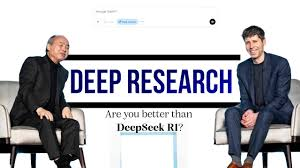A New Era of AI Research Begins
OpenAI has just unveiled deep research, a groundbreaking capability within ChatGPT that independently conducts multi-step research on the internet. The tool, designed to handle complex reasoning and analysis, has already demonstrated its potential by achieving a 26.6% score on Humanity’s Last Exam—more than double the previous best. With this achievement, deep research has outperformed both DeepSeek R1 and Google’s Gemini Thinking, signaling a major leap in AI-driven knowledge work.
Announcing the feature on X (formerly Twitter), OpenAI CEO Sam Altman called it a “superpower—experts on demand” that can complete research tasks in minutes, tasks that would typically take human experts hours or even days and cost hundreds of dollars.
So, what makes deep research a game-changer? And could this be the moment OpenAI finally pulls ahead of Google and DeepSeek in the AI arms race?
How OpenAI’s Deep Research Works
Unlike traditional AI chatbots that provide answers based on their training data, deep research is designed to think, analyze, and research like an expert.
🔹 Autonomous Research: The tool can browse the internet, read articles, summarize key insights, and cross-reference multiple sources—just like a professional researcher.
🔹 Multi-Step Reasoning: Instead of relying on pre-trained knowledge alone, deep research adapts, verifies, and refines its understanding dynamically.
🔹 Comprehensive Reports: Users receive structured, detailed research reports rather than single-response answers.
With these capabilities, deep research moves beyond static chatbot responses to dynamic, real-time knowledge generation—something that Google’s search engine and DeepSeek R1 currently struggle to match.
Crushing the Competition: Outperforming Google and DeepSeek
OpenAI’s 26.6% score on Humanity’s Last Exam is a significant leap forward, considering the previous best models barely crossed 10-12%. This means deep research can analyze, reason, and synthesize information at a level approaching human experts.
1. Beating DeepSeek R1
DeepSeek has positioned itself as a low-cost alternative to OpenAI, but its reasoning and research capabilities still lag. While DeepSeek R1 is efficient for standard chatbot applications, it lacks the advanced multi-step research and deep analytical thinking that OpenAI has now unlocked.
2. Outpacing Google’s Gemini Thinking
Google’s Gemini Thinking is a direct competitor to OpenAI’s research capabilities, but deep research has set a new benchmark. While Gemini excels at multimodal reasoning (text, images, and video), OpenAI’s new feature appears to be more effective in structured research tasks that require synthesis from multiple sources.
Why This Is a Big Deal for Businesses and Researchers
Deep research isn’t just a technological flex—it has real-world applications that could change how businesses and individuals approach knowledge work:
✅ Startups & Enterprises: Companies can use deep research to analyze competitors, track industry trends, and generate detailed market reports—all within minutes.
✅ Academia & Science: Researchers can leverage AI for literature reviews, hypothesis testing, and data synthesis, accelerating discoveries in science and medicine.
✅ Legal & Finance Sectors: AI-driven legal research and financial analysis could cut costs and boost efficiency, reducing dependency on expensive human experts.
Is OpenAI Now Unstoppable?
Deep research is more than just another AI tool—it represents a fundamental shift in how AI interacts with the internet. By combining real-time browsing, advanced reasoning, and autonomous research, OpenAI may have outmaneuvered Google and DeepSeek in the AI race.
But the competition isn’t standing still. Google will likely enhance Gemini’s research capabilities, and DeepSeek might refine its AI to catch up. However, OpenAI now holds the advantage, pushing AI closer than ever to expert-level reasoning and real-world knowledge synthesis.
For now, deep research gives OpenAI a critical edge, and it might just be the tool that finally outthinks Google, DeepSeek, and even human experts.
